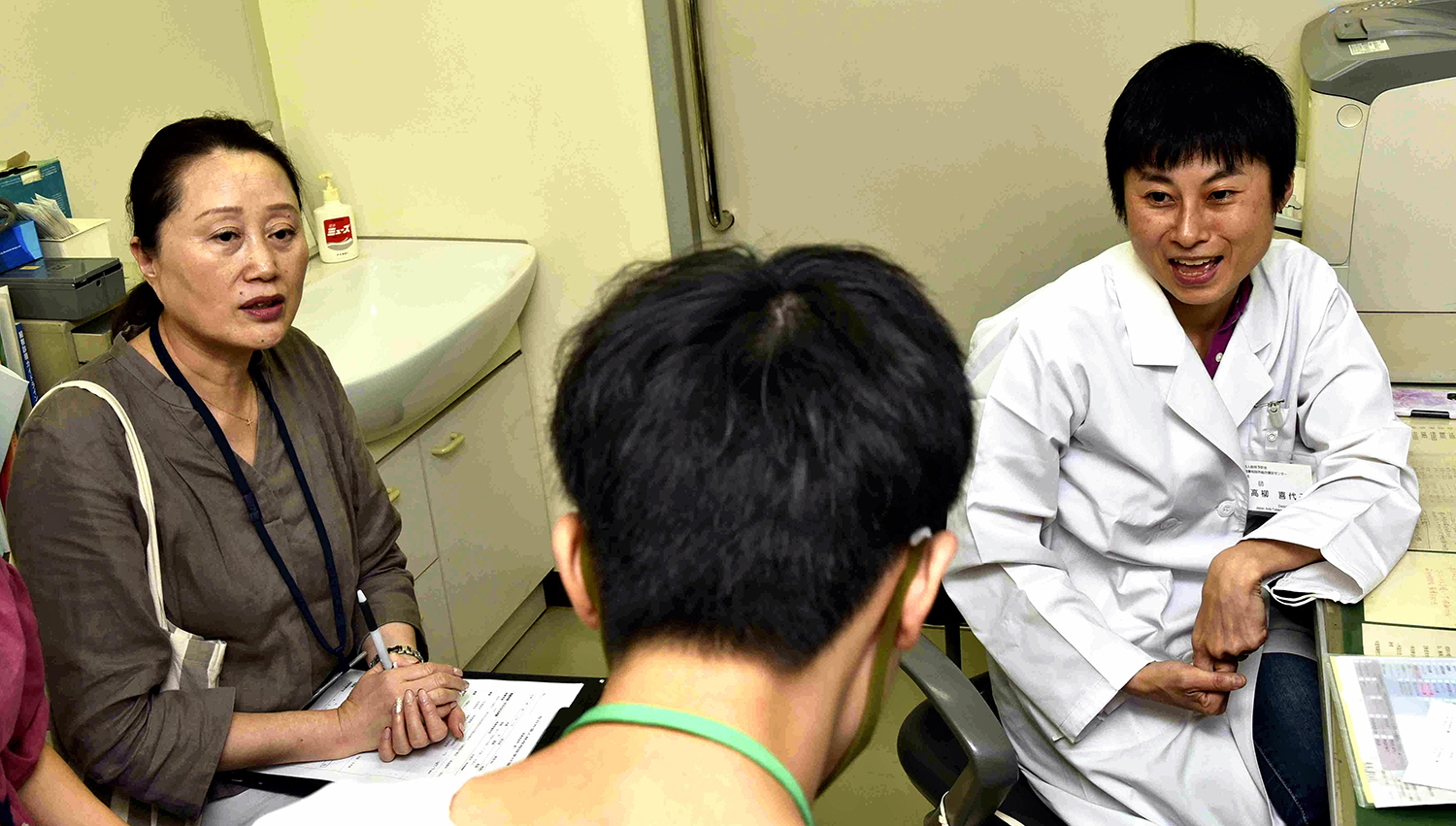Infectious disease prevention crucial for Tokyo Games

A Chinese student, center, sees a doctor, right, after being identified as a possible tuberculosis patient at the Japan Anti-Tuberculosis Association in Tokyo. An interpreter is there to help him communicate with the doctor. The Japan News/Asia News Network
TOKYO — With less than a year before the opening of the Tokyo Olympics and Paralympics, Japan is ramping up efforts to detect and contain any outbreaks of infectious diseases such as tuberculosis and rubella.
Areas around the Games venues where many people from Japan and abroad will gather could become a source of group infection, so it has become a national challenge to prevent infectious diseases from entering Japan.
In mid-July, a Chinese man visited the Japan Anti-Tuberculosis Association (JATA) in Chiyoda Ward, Tokyo. He had been referred to the hospital after being tested for TB and was suspected of infection. An interpreter for the man translated the doctor’s conclusion that the man was likely not infected. The man left the institution in relief.
Students from China, Vietnam and Nepal visit JATA one after another. Many patients get infected in their home countries and develop symptoms after coming to Japan. They largely study at Japanese-language schools during the day and work part-time at restaurants and convenience stores at night. Living such a hectic life in an unfamiliar foreign country can cause exhaustion, which could contribute to them developing the disease in some cases.
TB patients suffer prolonged coughs, sputum and mild fever. The disease can be fatal.
According to the Health, Labor and Welfare Ministry, 16,789 new TB patients were reported in Japan in 2017, or 13.3 patients per 100,000 people, which is higher than the United States and Europe, which have an index of less than 10.
While the number of overall patients is on the decline, the number of foreign patients has nearly doubled from 10 years ago to 1,530. The number of foreign visitors to Japan is expected to increase next year when the Olympics and Paralympics are held.
In Oita Prefecture, where many of the foreign students are from Asia, public health centers are working with universities to prevent TB. Public health nurses at universities are available to help foreign students, asking if they are taking medicine properly and if they have any concerns about treatment or education. By creating an environment in which people can receive medical tests and treatments easily, the prefecture is trying to prevent the spread of infection.
Internal threat
Infectious diseases are not only a threat from overseas. The number of patients suffering from rubella and measles has been increasing at an unusual pace in recent years.
In particular, the number of rubella patients exceeded 2,000 this year. More than 650 people have measles.
Such infections are transmitted by inhaling pathogens common in coughs and sneezes. If spectators carrying those viruses transmit those pathogens at Olympic venues, the risk of a mass infection would increase through people not sufficiently protected by vaccinations. If foreign visitors return home from Japan without noticing that they have been infected, a worldwide epidemic “from Tokyo” could become a real possibility.
“With more people traveling abroad, the risk of infectious diseases is rising. We must cope with it seriously,” a health ministry official said.
Heighten defenses
The government has set up a liaison council across ministries and agencies at the Cabinet Secretariat to deal with infectious diseases ahead of the 2020 Olympics and Paralympics.
The health ministry is taking the lead in cooperation with the Foreign Ministry and the Justice Ministry to check visitors at the time of arrival in Japan, and also review a system to assess outbreaks within the country.
There are plans to increase the capacity of quarantine stations by 1.2 times over the five-year period ending on March 31, 2020. People entering the country undergo thermographic examinations. If any are detected to have a fever, they undergo consultations and examinations.
To strengthen the monitoring function, the criteria for medical institutions to report on patients to authorities would be narrowed down to “being suspected of having an infection” or “their symptoms being serious.”
Those who come from six Asian countries including the Philippines, China and Vietnam and plan to stay in Japan for more than 90 days would be required to undergo TB checks before their departures, as 80 percent of foreign patients with TB are from those countries. The government will not issue them visas unless they obtain a certificate indicating they are not infected with TB that must be issued by medical institutions designated by Japan.
Even so, people with TB may pass the test. Shinjuku Ward, Tokyo, which has a concentration of Japanese-language schools, has required students to undergo a TB test from once a year to three times a year since last fiscal year in order to detect infections as soon as possible.